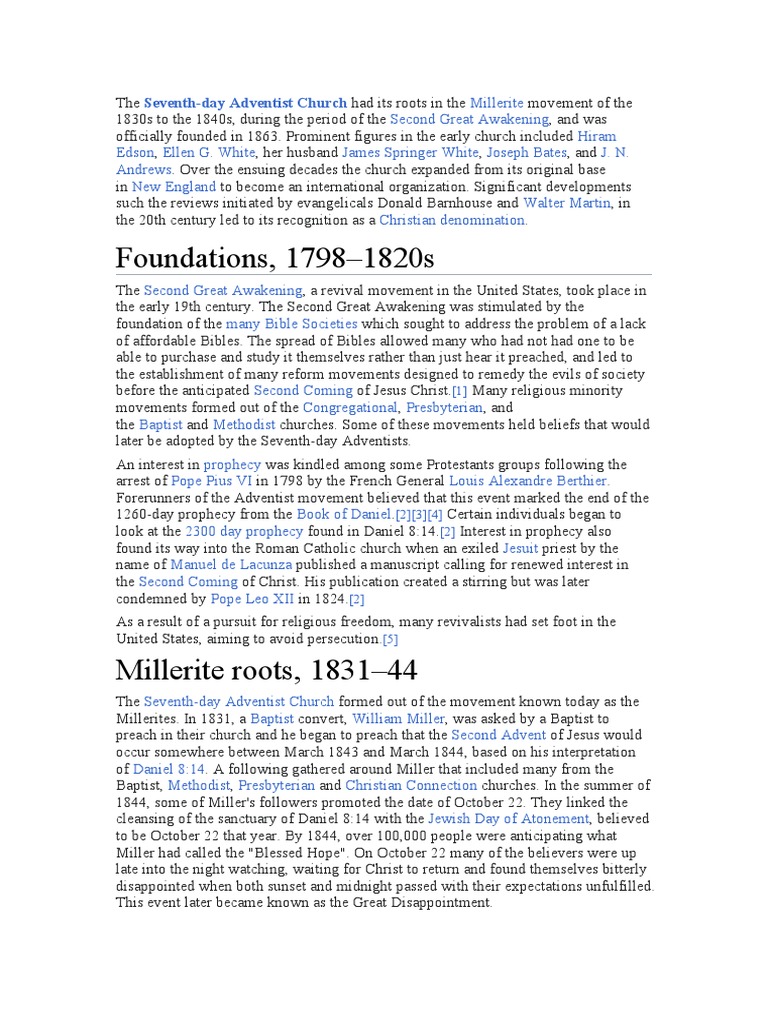The Seventh-day Adventist (SDA) Church represents a unique branch of Protestant Christianity, distinguished by a set of beliefs and practices that incorporate elements of traditional Christian doctrine along with distinctive teachings derived from prophetic interpretations, particularly inspired by the writings of Ellen G. White, one of the church’s founding figures. At the core of the SDA faith lies a profound emphasis on the Sabbath, dietary principles, and the imminent return of Jesus Christ, intertwining both theological and practical aspects of life.
A fundamental tenet of the SDA Church is its observance of the Sabbath on the seventh day of the week, Saturday. This practice is grounded in the Fourth Commandment, which commands the faithful to rest on the Sabbath, reflecting God’s creation week where He rested on the seventh day. For Adventists, this day is not merely a hiatus from work; it is a sacred time dedicated to worship, reflection, and community. This emphasis on Sabbath observance is emblematic of their broader approach to the tenets of faith, where practice and belief are profoundly intertwined.
The Adventist belief in the Second Coming of Christ, or the “Advent,” is paramount. Adventists anticipate this eschatological event with great urgency, believing it will usher in a period of divine judgment followed by a period where the faithful will enjoy eternal life with God. This belief anchors their understanding of human history and spiritual destiny, encouraging a lifestyle of readiness and moral integrity. They view the church as a prophetic voice, equipped to warn others of the impending return of Jesus, thus placing an emphasis on evangelism and outreach efforts in contemporary society.
In the realm of theology, the SDA Church espouses a unique perspective known as “Conditionalism” regarding human immortality. According to this belief system, humans do not possess an inherently immortal soul. Instead, they advocate for the idea that immortality is a gift granted by God only to the righteous, while the wicked will face ultimate destruction rather than eternal torment. This perspective seeks to align with a just and loving God, mitigating the traditional views of eternal damnation, which, they argue, conflict with the character of a benevolent deity.
Moreover, the SDA Church places significant importance on health and wellness. This dedication is reflected in their health message, which promotes a vegetarian diet, regular exercise, and the avoidance of harmful substances, such as tobacco and alcohol. This holistic approach to health stems from the belief that physical well-being is inherently connected to spiritual vitality. The church runs numerous health initiatives, emphasizes preventive care, and operates hospitals and clinics worldwide, underscoring a commitment to improving community health and exemplifying the church’s mission of service.
Another notable aspect of the SDA belief system is its emphasis on the prophetic gift, particularly that of Ellen G. White. Her writings serve as a guiding compass for many adherents, offering counsel on spirituality, health, and community life. While SDA theology maintains that the Bible is the ultimate authority, White’s works are highly regarded within the community for their instructional value. Her prophetic contributions have reinforced key elements of the church’s identity and helped shape its communal ethos.
The concept of “Investigative Judgement” also sets the Seventh-day Adventist Church apart from other Christian denominations. This doctrine holds that Christ began a process of judgment in heaven in 1844, where He is said to be reviewing the lives of believers to determine their eligibility for salvation. This belief serves to inform the moral behavior of church members, as it encourages a lifestyle of accountability and reverence towards God’s commandments.
In terms of structure, the Seventh-day Adventist Church operates with a congregational model under a larger organizational umbrella. Local churches affiliate with conference and union levels, all overseen by a General Conference based in Silver Spring, Maryland. This governance structure allows for both local autonomy and unified mission across the global church community, fostering a sense of collective identity while empowering local churches to respond to community-specific needs.
Moreover, the SDA Church engages in an extensive global mission, establishing a presence in most countries around the world. This global outreach is manifested through various educational and health institutions, including schools, universities, and hospitals, which embody the church’s commitment to comprehensive service and development. The emphasis on education is particularly noteworthy, with Adventists advocating for both academic and spiritual growth, leading many believers to pursue higher education and professional development.
In conclusion, the Seventh-day Adventist Church stands as a distinct entity within the Christian tradition, marked by its observance of the Sabbath, its anticipation of the imminent return of Jesus Christ, and its holistic approach to health and wellness. With an emphasis on prophetic insight and communal responsibility, it strives to live out its faith through service and evangelism. The unique blend of beliefs and practices not only shapes the daily lives of its adherents but also invites an exploration of the profound complexities of faith and spirituality in the contemporary world. As such, the SDA Church continues to provide a rich tapestry of theological insight and community engagement, drawing individuals and families toward a collective journey of faith.



